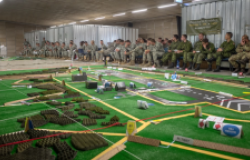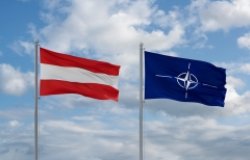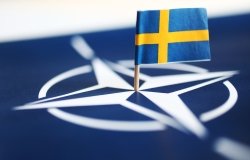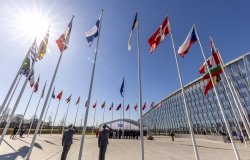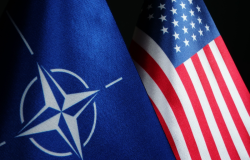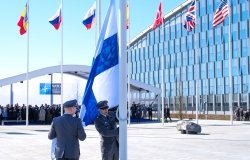NATO Today, EU Tomorrow: Bulgaria's New Missions
Policy Forum featuring Ambassador Elena Poptodorova, Bulgarian Ambassador to the U.S. Generous support provided by Lockheed Martin
Overview
EXECUTIVE SUMMARY
By Susan M. Spencer
Writer and Senior Editor, Western Policy Center
In previous periods in international relations, the mantra has been "peaceful coexistence" and "rapprochement," while, today, the point of reference is security.
Bulgaria is a NATO member and is expected to become a full member of the European Union in 2007. Bulgaria's entry into NATO has determined irrevocably and definitively the country's place in the world and its strategic orientation. The country has gone through painful periods in preparing for membership in the alliance, a process that has been political. Now, Bulgaria faces practical challenges, which include two major legislative processes: the Military Doctrine and the National Military Strategy, which were both passed by parliament in 2002. The Military Doctrine includes new contingencies for both peacetime and wartime, and may have to be re-examined now.
Bulgaria's Strategic Defense Review, passed by parliament in 2004, involves the assessment of risks and threats, and the management of them, and includes the reduction of the armed forces from 45,000 troops to 39,800 by 2015. It also involves a change in the quality of the armed forces, with a reduction in the number of tanks from 600 to 170. For decades, Bulgaria has operated with a conventional army. Now, it is focusing on the development of mobile forces that can serve in a quick response capacity as part of the realignment of its armed services through discussions with the European Union and the United States, and with the input of U.S. experts.
The defense reform implementation plan will be discussed with the Pentagon and the State Department in order to follow up on the new concept of forces and armaments, as well as the funding required to carry out the needed military reform. Bulgaria has approved 11 programs for the modernization of the army, which will involve heavy funding. The Bulgarian government is seeking "packages" in Washington that will enable it to implement these programs, which will be indispensable to the success of NATO operations in the future. Sofia is looking beyond the U.S.'s Foreign Military Financing (FMF) program, which is a well-established form of cooperation with Washington.
By the end of 2004, the Bulgarian government hopes that a U.S. team will finalize arrangements for the military facilities in Bulgaria that will be involved in the redeployment of U.S. forces in Europe to forward bases. These arrangements will have a direct bearing on the modernization of the Bulgarian armed forces, as well as on national and regional security. Bulgaria is taking part in both combat operations, such as those in Iraq, where 480 Bulgarian soldiers are deployed, and peacekeeping operations, so it is imperative that its forces be funded and equipped. Bulgaria currently deploys a total of 820 troops worldwide. In addition to Iraq, they are in Afghanistan, Bosnia, Kosovo, Eritrea, and Tajikistan.
Concerning the reform of Bulgaria's security sector, additional legislation is needed regarding the regulation of secret services. A law on the protection of classified information led to the establishment of a state commission on security operations, which has been operating for one year.
The negotiations for EU membership, which were completed in June 2004, involved a complete review of the economic structure of the country. At the December 2004 EU summit, Bulgaria is awaiting an announcement by the European Council that EU membership negotiations have been officially concluded, as well as the Council's designation of a date for the signing of the accession treaty as soon as possible in 2005, hopefully in the spring. Bulgaria's accession process is linked with that of Romania, which is expecting to complete its negotiations by the end of this month. Bulgaria hopes to sign the accession treaty along with Romania, since the two countries have moved toward membership together.
The competitiveness of the European Union market is expected to impact small private businesses and industries in Bulgaria, so professional groups must be ready to help these firms face the challenges they will encounter when Bulgaria is an EU member.
The term "balkanization" no longer seems applicable to the region. A number of organizations that promote regional cooperation are in place. The Stability Pact is now moving forward; the Southeast European Cooperative Initiative (SECI), which was launched by the United States, is functioning well; and the GUUAM (Georgia, Ukraine, Uzbekistan, Azerbaijan, and Moldova) group is addressing issues such as organized crime and corruption in the region. The Bulgarian government has proposed that a cyber security center be established in Bulgaria as part of the war against terrorism.
Post-September 11 events have shown that international terrorism affects everyone in the world, since those who cannot achieve their political goals through diplomacy can strike anywhere. Bulgaria joined the coalition against terror from "day one," and the September 11 attacks triggered a political consensus among the Bulgarian political parties in favor of NATO membership. The events in Beslan, Russia, and the murder of Dutch filmmaker Theo van Gogh in the Netherlands are examples of "home-grown" terrorism. They should be a powerful reason for all democratic-minded countries to arrive at a common definition of terrorism. Europe could not reach a unified position with regard to Iraq.
There are political figures and opinion makers on both sides of the Atlantic who say that NATO is no longer relevant, while there are those who say that it is even more important than it was before. The fact that the first foreign visitor to the White House following President Bush's re-election was NATO Secretary General Jaap de Hoop Scheffer was symbolic. The visit was indicative of Bush's commitment to the alliance, as the person who will lead the direction of U.S. foreign policy. With the second visitor, British Prime Minister Tony Blair, Bush showed that he is engaged in the Middle East. If Bush recommits the United States to the Middle East peace process, it will help to improve trans-Atlantic relations.
If Europe views itself as a counterweight to the United States, trans-Atlantic tensions will be exacerbated. Europe should not aspire to the status of a military superpower. Any attempt in Europe to provide a balance to U.S. military might will result in unilateral tendencies in Washington. Attempts to achieve a military balance of power belong to countries that regard each other as adversaries, not as allies. Europe and the U.S. are partners. Some EU members are not ready to add "muscular power" to wider military efforts and are committed more to regional conflicts. With regard to world security, Europe's strategic concerns are identical to those of the United States.
Europe and the United States enjoy broad economic relations. Both have a shared vested interest in "healing" the harm that was done to trans-Atlantic relations in 2003 and 2004. It is important that Europe speak in "one voice." If that is the case, any U.S. administration will listen to it. The symbols of today's foreign policy are Ramallah and the question of who will succeed Yasser Arafat, as well as the battle in Fallujah. The outcome of these events will impact whether there will be a peaceful transition in Gaza and an election in Iraq. Success on both fronts will have a significant influence on moving trans-Atlantic relations forward. This process will also be aided if the U.S. reaches out to Europe on the Palestinian question, Iran, and Iraq.
With the war on terrorism and the fronts in Afghanistan and Iraq, attention is fading away from the Balkans. The Balkan countries need to be supported for the positive things they have achieved over the last five years. It is important to finish the peacekeeping operations in the region.
Bulgaria is a strong supporter of Turkey's accession to the European Union. With further expansion, the EU will have additional responsibilities concerning international terrorism and weapons of mass destruction.
Bulgaria is no longer in a cycle of irregular elections, having entered a cycle of regular elections. Regardless of the outcome of the elections next year, there will be continuity in Bulgaria's foreign and security policy.
Summary of Questions and Answers:
Q: Do you see Kosovo as an area where U.S.-European cooperation will take place? What role can Bulgaria play in Kosovo?
A: Bulgaria has been very involved in working toward a solution in Kosovo through the United Nations and the Council of Europe, and through its current chairmanship of the OSCE. Joint action is needed concerning "statehood." NATO, the EU, and other international entities must play a role in arriving at a solution. It is too sensitive an issue to be dealt with unilaterally and is an area where renewed trans-Atlantic relations could be exercised. Both Macedonia and Serbia need to be taken into account.
Q: What is the status of the oil pipeline projects that Bulgaria is involved in?
A: The pipeline from the Bulgarian Black Sea port of Burgas to the Greek Aegean port of Alexandroupolis and the pipeline from Burgas to the Albanian Adriatic port of Vlore through Macedonia are still under discussion. Both have been approved by the Bulgarian government, but no memorandum for either project has been signed. The corporate world will be involved in determining the viability of the projects.
Q: Does Bulgaria recognize "the Former Yugoslav Republic of Macedonia" as "Macedonia"?
A: In 1992, Bulgaria was the first country to recognize Macedonia as a state. There is an area in Bulgaria called Macedonia. History cannot help solve present-day problems. There has been no move by the EU concerning recognition of the name "Macedonia."
Q: In your outline of Bulgaria's security policy, where does the Black Sea Economic Cooperation (BSEC) initiative stand?
A: Bulgaria was one of the founding members of BSEC, which has a role in regional security.
Q: What is your opinion of the Ohrid agreement?
A: It accomplished what was possible, that is, it was successful at keeping insurgencies under control and, therefore, helped to achieve stability. An agreement that prevents groups from fighting is a good one.
Q: How are the U.S. and Bulgaria working together to combat the spread of organized criminal enterprises?
A: Bulgaria has made a strong effort to combat organized crime through Interpol and through daily cooperation with U.S. security agencies to address trafficking in arms and narcotics, as well as the illegal financing of terrorist groups and the movement of terrorists. The interception of narcotics such as heroin, marijuana, and amphetamines at the Bulgarian border has indicated that international cooperation in this area is working. It has also indicated that Bulgaria has tightened its border control, which is necessary for both EU and NATO membership. USAID has provided $6 million in assistance to Bulgaria to combat corruption and strengthen law enforcement, which has an impact on organized crime.
Q: What plans does Bulgaria have to grow its economy to fund its 11 defense reform projects and other defense initiatives?
A: Bulgaria has had steady growth, ranging from 4.5 percent to 4.8 percent. In 2005, it is expected to be up to 6 percent. Defense modernization is costly, so Sofia hopes to arrive at agreements with the United States on the "packages" under discussion in conjunction with the establishment of U.S. military facilities in Bulgaria. Bulgaria has never before had such a close relationship with the United States. The southeastern end of NATO is not fully and properly protected. Bulgaria has urged the U.S. Congress and the State Department to look at broader "packages" that will serve the interests of both Washington and Sofia.
Q: What is Bulgaria's policy toward Russia?
A: Bulgaria's relations with Russia have been crucial and sensitive since the end of the Ottoman Empire. In both Sofia and Moscow, there is an understanding that the world is changing dramatically, and every country is free to make its own choice. Bulgaria has made its strategic choice, which was supported in parliament by all political parties. No political party would now risk changing the strategic course of Bulgaria. Russia is important to the U.S., and it will be important to Bulgaria in the future.
Q: What will the issues be in Bulgaria's 2005 elections?
A: How smooth Bulgaria's transition into the EU will be economically, as well as health and education issues.
Q: Is the EU's rapid deployment force a duplication of NATO's rapid reaction force?
A: The two forces should be complementary. The EU force should be involved in regional matters, but it should not be separate from NATO. It should function as a "division of labor" within NATO. NATO will engage its force on a broader scale, while the EU force can step in regionally, for example, in the Balkans. The two forces should be under one umbrella of unified military planning.
Hosted By

Global Europe Program
The Global Europe Program is focused on Europe’s capabilities, and how it engages on critical global issues. We investigate European approaches to critical global issues. We examine Europe’s relations with Russia and Eurasia, China and the Indo-Pacific, the Middle East and Africa. Our initiatives include “Ukraine in Europe” – an examination of what it will take to make Ukraine’s European future a reality. But we also examine the role of NATO, the European Union and the OSCE, Europe’s energy security, transatlantic trade disputes, and challenges to democracy. The Global Europe Program’s staff, scholars-in-residence, and Global Fellows participate in seminars, policy study groups, and international conferences to provide analytical recommendations to policy makers and the media. Read more
Thank you for your interest in this event. Please send any feedback or questions to our Events staff.
